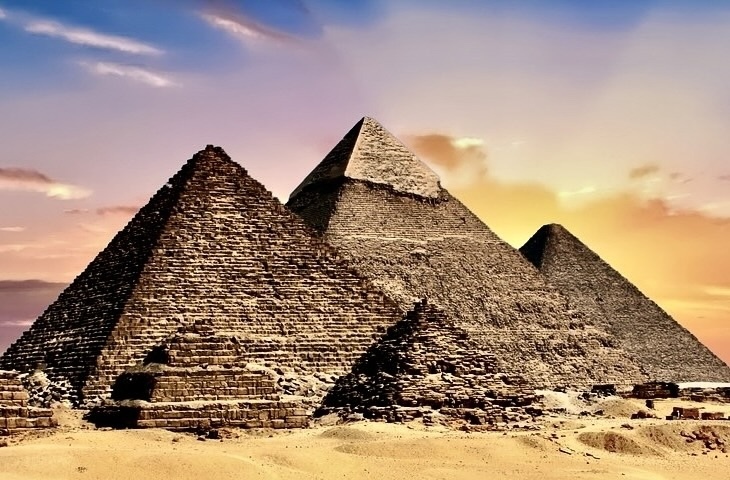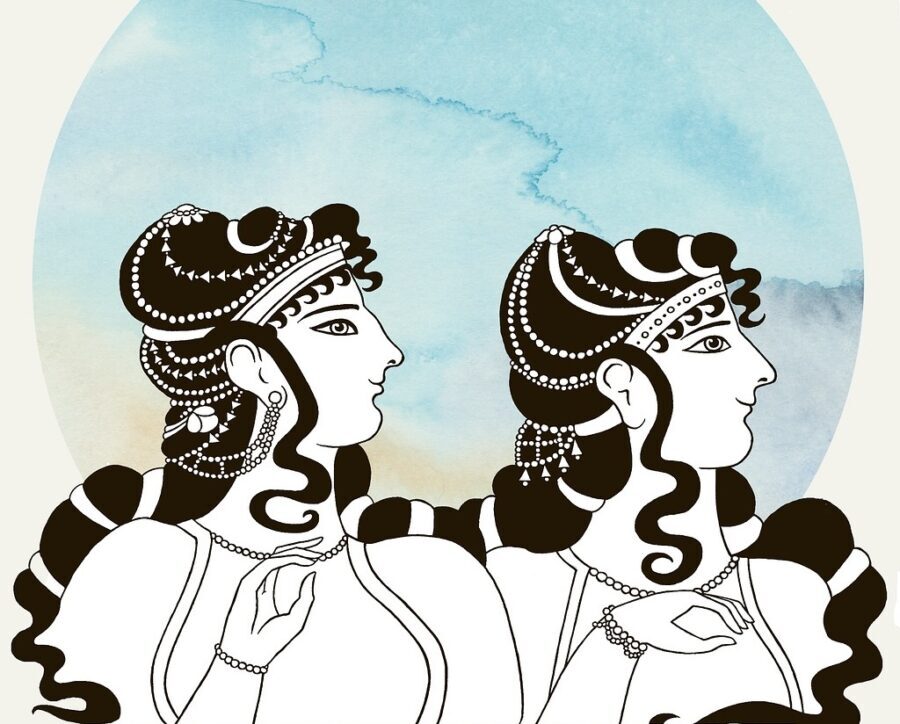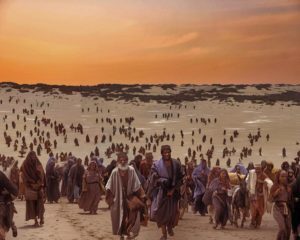
David Rohl is a British Egyptologist with a reputation for the controversial. Regarded by his colleagues as a maverick, Rohl proposes bold solutions to some of the ancient world’s greatest historical conundrums – many related to the epic stories of the Old Testament. He regards himself as an agnostic, yet he argues for a historical Bible. He accepts that he is a heterodox who does not accept orthodoxy simply because it is the consensus view. Rohl is a fully trained scholar with a degree in Egyptology, ancient history, Levantine archaeology, and the history of ancient Greece, whilst his post-graduate research concentrated on the complex and rarely studied chronology of the Third Intermediate Period in Egypt.
Rohl’s conclusions have been dismissed by academia, mainly on the grounds that they are too bold, too radical and not supported by the evidence. He would disagree with the last sentiment, arguing that most scholars who dismiss his work are not themselves familiar with the material and have not understood his evidence, since they have not actually read his books. He feels they are simply regurgitating an anti-Rohl consensus, which amounts to “we all know he’s wrong”, even though a detailed and thorough critique of his work has never been offered. Many in the general public, on the other hand, have been captivated by his research and, as a result, he has become the de facto leader of a new ‘Bible as history’ movement.
Here Rohl discusses the question of the historical basis for the Exodus story, given the renewed interest engendered by two new films on the subject released in the last twelve months.
Question 1: With the recent release of Ridley Scott’s ‘Exodus: Gods and Kings’ and even more recently the documentary movie ‘Patterns of Evidence: The Exodus’, why do you think the Exodus story remains a compelling topic for both filmmakers and moviegoers?
David Rohl: Biblical epics have always been a part of the movie scene, almost from the birth of Hollywood just before the advent of the First World War. The original great epic was Cecil B. DeMille’s 1923 black and white, silent movie ‘The Ten Commandments’. The biblical epic genre has tended to come and go in cycles. It was done to death in the 1950s and 60s, reaching its zenith with DeMille’s color remake of ‘The Ten Commandments’ in 1956, starring Charlton Heston as Moses and Yul Brynner as Ramesses II. And now, as you rightly point out, the biblical epics have come back into fashion once more in the last couple of years with the release of ‘Noah’ and ‘Exodus: Gods and Kings’. The reason for this resurrection seems to be the popularity of fantasy movies, whether it be vampires and werewolves, super heroes or hobbits, elves, orcs and golden rings … and, of course, because Hollywood now has the new toy of CGI (Computer Generated Graphics) to make the mighty miracles of Genesis and Exodus even more impressive for the demanding moviegoer.
The thing is that the Bible stories are very much a part of our heritage – within both Jewish and Christian communities – and, of course, Hollywood was virtually created by Jewish filmmakers and producers imbued, through the annual Passover meal, with the legend of their ancestral and religious origins.
But the academic disciplines of archaeology and ancient history have moved on, far ahead of Hollywood, in the sense that, over the past fifty years since Charlton Heston parted the waters of the Red Sea, scholars have conclusively demonstrated that there is no evidence of a large population of Semites sojourning in Egypt at the time of Ramesses, nor an Exodus from Egypt in his reign, and especially no military conquest of the Promised Land (i.e. Canaan) during the closing years of Egypt’s 19th Dynasty (archaeologically speaking the transition from the Late Bronze Age to the early Iron Age). As a result, the Exodus epic is regarded as nothing more than a ‘pious myth’ created by the Judean priesthood of the seventh to third centuries BC in order to provide a mythical past for the Jewish people.
Question 2: But you would disagree with those findings wouldn’t you? In ‘Patterns of Evidence: The Exodus’ you say that you believe Moses was the first historian, long before Greeks like Herodotus wrote their histories of the ancient world. Does this mean the Bible can be viewed as a kind of history book?
David Rohl: Yes. Actually I don’t disagree with the findings of archaeologists at all … far from it. I concur completely with the view that there was no Exodus and Conquest during the 19th Dynasty. The evidence is perfectly clear on that. Where I disagree is in treating the Old Testament narratives as a work of fiction. I prefer to view the stories as legendary narratives based on genuine historical events. Exaggerated and aggrandized? Certainly. Legendary? Probably. But myth? No.
For me, the reason why we find no evidence for the Exodus narratives in the closing years of the Late Bronze Age is because it didn’t happen then but rather much earlier, towards the end of the Middle Bronze Age. In other words, archaeologists have been looking in all the right places for the Sojourn, Exodus and Conquest stories but in entirely the wrong time.
Question 3: I read that you regard yourself as an agnostic, yet, as you say, you believe there are some historical truths in the various books of the Bible. How do you go about distinguishing fact from fiction in the Old Testament?
David Rohl: It’s very simple. I treat the biblical text like any other ancient document. Just because it’s a ‘religious text’ doesn’t mean it has no history in it. In fact, many of the annals and narrative texts from the ancient world are ‘religious’ in the sense that kings go into battle with their gods by their sides. Ramesses II claims to have won the Battle of Kadesh with the personal support of his god Amun, literally by his side. We wouldn’t dismiss the Battle of Kadesh as ‘pious fiction’ on that basis would we? Today, most scholars would accept the historicity of the Trojan War, even though Homer’s Iliad is replete with the interventions of gods on both sides during the battles. Why then should we treat the biblical text differently?
So I analyze the narrative, looking for potentially historical elements (not miracles or personal details that have no hope of being seen in the archaeological record). I then test the sequence of those ‘historical’ elements against the archaeological evidence in Egypt and Israel/Palestine. If I observe a pattern of evidence in the archaeology which matches the biblical narrative, then I can conclude that the narrative has a basis in history. If there is no match at any point in the historical timeline, I conclude that the story is not based on real events. I would approach any ancient document in exactly the same way. Let’s not throw out the baby with the bath water just because the baby is called the Bible!
Question 4: As you say, in our current scholarly climate, even if historians do not believe the Exodus occurred, they still choose to place it hypothetically in the time of Pharaoh Ramesses II. Then, when archaeologists look for evidence for these events in that time period, they find nothing, which seems to confirm their view that the Exodus is nothing more than a myth. Do you think Scott’s film adds to the general impression that the Exodus is merely a fairy tale?
David Rohl: Now, there’s the rub of the matter – a prime example of circular reasoning, which Ridley Scott perpetuates in his ‘fantasy movie’. The first chapter of the Book of Exodus mentions that Israelite slaves built a city called ‘Raamses’. Now scholars take that to mean the city of Pi Ramesse (the ‘Estate of Ramesses’) built as Ramesses II’s delta capital. On that basis … and that basis alone … they date Moses to the time of Ramesses II and the Exodus and Conquest to the 19th Dynasty. Then, when they examine the archaeology, they find no evidence for these events.
But that’s not all. They then use the Bible to construct the entire chronology of the Egyptian dynasties! Ever since the days of Champollion (decipherer of the Egyptian hieroglyphs in 1822) the Egyptian king Shishak, plunderer of Yahweh’s temple in Jerusalem in Year 5 of the reign of Solomon’s son Rehoboam, according to the Books of Kings and Chronicles, has been identified with Pharaoh Shoshenk I, founder of the 22nd Dynasty. Shoshenk undertook a military campaign into Canaan in his 20th year, and it’s fair to say that the names Shishak and Shoshenk do sound similar. But, as I and other scholars have pointed out, the campaigns of Shishak and Shoshenk are completely different. Whereas Shishak invades the kingdom of Judah, captures Rehoboam’s fortified towns and plunders the temple and palace in Jerusalem of its treasures, Shoshenk avoids Judah and focuses his campaign in the northern kingdom of Israel. According to the Bible, the king of the Northern Kingdom, Jeroboam I, was an ally of Egypt. So the campaign of Shoshenk is the complete opposite of the campaign of Shishak. I believe Shoshenk is not Shishak and we must look for Shishak in the identity of another historical pharaoh who is much more famous.
Nevertheless, Egyptologists date Shoshenk’s 20th regnal year to 925 BC, based solely on the biblical date of 925 BC for the fifth regnal year of Rehoboam, when Shishak plundered the Temple of Solomon. So … and this is the important point … we use the Bible to date the 22nd Dynasty and, from that, working backwards, we arrive at the dates for Ramesses II (1279-1213 BC). Having done so, scholars then find that there is no evidence for the Exodus in this era, and so dismiss the Bible as fiction. Can you see the methodological circularity here? Egyptian history is dated by a book which is subsequently regarded as a work of fiction!
Question 5: ‘Patterns of Evidence: The Exodus’, on the other hand, is a documentary that takes a serious and fair-minded approach towards ascertaining whether or not the events of the Sojourn, Exodus and Conquest actually happened. The centerpiece of the film is your ‘New Chronology’. What are the origins of the New Chronology and what does it set out to do?
David Rohl: The New Chronology is my attempt at restructuring the ancient timeline of Egypt using only the Egyptian internal evidence (not relying initially on any biblical dating), plus retro-calculable astronomical events recorded in the ancient documents which can be tied to actual historical events. I then use that new chronological framework to see how it synchronizes with other ancient civilisations, such as the Bronze Age Greeks and Anatolians, and the biblical narratives. That research has been underway now for over forty years, since I first noticed anomalies in the Egyptian timeline back in the 1970s.
The conclusion that arises out of this re-examination and reworking of Egyptian chronology is that scholars have artificially stretched out the pharaonic timeline, making it around three centuries too old. This is why the Old Testament events can’t be found in the conventional or orthodox chronology. With the three centuries removed from the timeline, the dates for the Egyptian Middle Kingdom and New Kingdom are lowered (younger in time) and therefore align quite differently with the timeline of the Bible.
Question 6: So basically, if we look several centuries further back in time from the reign of Ramesses everything begins to fit together?
David Rohl: That is not quite the right way to see it. Ramesses II’s dates are now lower, shifting down by three centuries. He is now a king of the tenth century BC and therefore a contemporary of Solomon (whose dates have not shifted). It is then interesting to discover that Ramesses had a hypocoristicon or short-form of his name used throughout Canaan. He was called Shisha … does that remind you of a certain pharaoh who plundered the Temple of Solomon in 925 BC?
Looking further back in time, the biblical Exodus date of 1447 BC now falls in what Egyptologists call the Second Intermediate Period, which is the archaeological period known as the Middle Bronze IIA-IIB. It was at this time that we find a huge city, lying underneath the 19th Dynasty capital of Pi Ramesse (biblical Raamses), known in the contemporary texts as Avaris. And this Middle Bronze Age city, located in the land of Goshen, was teaming with Semites who had initially migrated from Canaan into the Egyptian delta. They then abruptly abandon the city and disappear. About half a century later the city of Jericho is violently destroyed, its walls falling down in an apparent earthquake. Jericho is then burnt to the ground and abandoned for nearly 600 years. All the cities described in the Book of Joshua as being ‘placed under the curse of destruction’ are also destroyed at this time.
_______________________________________
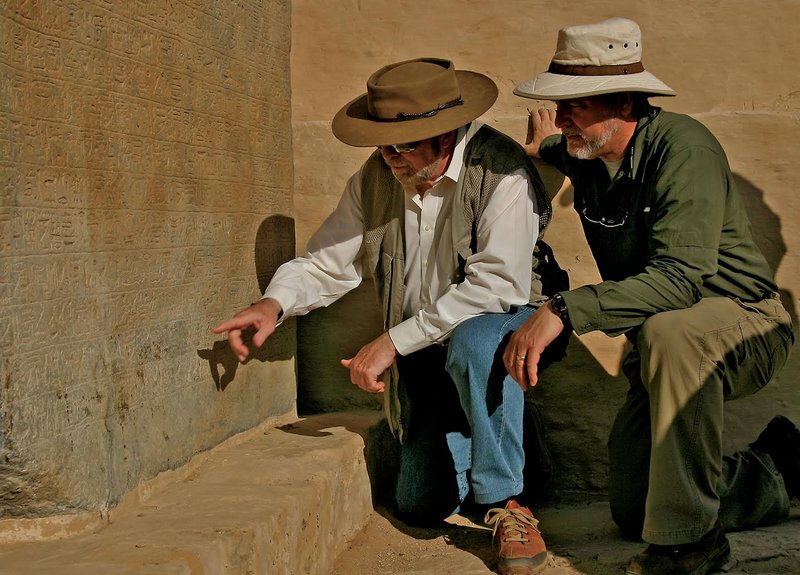 David Rohl and Director Tim Mahoney examining a replica of the ‘Israel Stela’ during the filming of ‘Patterns of Evidence: The Exodus’. Courtesy David Rohl
David Rohl and Director Tim Mahoney examining a replica of the ‘Israel Stela’ during the filming of ‘Patterns of Evidence: The Exodus’. Courtesy David Rohl
_________________________________________
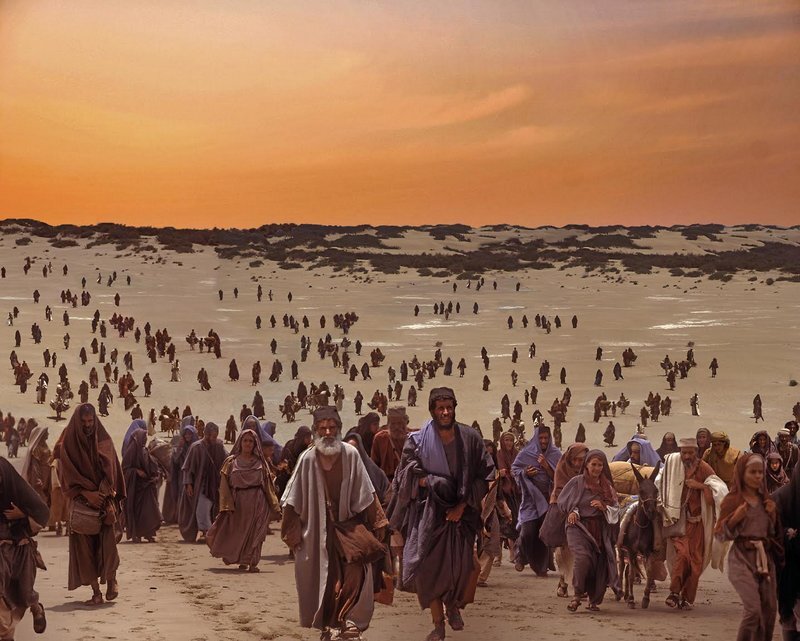 Recreated depiction of the Israelites leaving Egypt and heading into Sinai during the dramatic events of the Exodus. Courtesy David Rohl
Recreated depiction of the Israelites leaving Egypt and heading into Sinai during the dramatic events of the Exodus. Courtesy David Rohl
____________________________________________________
Question 7: What has been the response of religious believers to your New Chronology? To what extent does the New Chronology challenge or reinforce what they already believe?
David Rohl: It has been a mixed reaction. The general public in both the Jewish and Christian communities has welcomed it with open arms and people are genuinely excited by the discoveries resulting from the time shift. Evangelical Christian scholars, on the other hand, tend to be very much against it. They take their stance from the high priest of Egyptian chronology, Professor Kenneth Kitchen, who is also an evangelical Christian. When my first book A Test of Time (published in the USA as Pharaohs and Kings) came out in 1995, it went straight to the top of the bestsellers list, supported by a three-part TV documentary series. Kitchen immediately wrote a letter to his evangelical colleagues in America, ridiculing the hypothesis and dismissing it as “98% rubbish”. The effect was dramatic within evangelical scholarship. His letter was circulated throughout the evangelical world … I even received five copies myself from different sources – sympathetic scholars who thought I had better be made aware of what was happening.
So Kitchen effectively generated a strong negative reaction within Christian academia which took his decree on faith. Sadly that negativity still persists, even though Kitchen has gone a considerable way towards retracting his initial angry response. In 2004 a public debate was held at the University of Reading in the UK, where Professor Kitchen and I debated the issue ‘Exodus – Myth or History?’ in front of 450 conference delegates. In the closing discussion, Kitchen offered a public apology for his written outburst and then admitted that he now accepted that there were two ‘powerful sets of options’ for the Exodus dating – his own 19th Dynasty, Late Bronze Age date, which he continued to argue for, and the David Rohl Middle Bronze Age date. That admission has not been widely disseminated among Christian scholarship.
Question 8: Why do you think Egyptologists have not embraced the New Chronology?
David Rohl: Because Egyptian chronology is a very specialist field which most Egyptologists stay well clear of, preferring to accept Professor Kitchen’s chronology, which has been the orthodoxy for decades now. In effect, the Conventional Chronology has been set in stone and there is simply no appetite to re-examine it from the foundations upwards.
Question 9: Do you think “Patterns of Evidence: The Exodus” will help in showing the world that the New Chronology solves the problems that exist in the Conventional Chronology?
David Rohl: I hope so. The film has created a new momentum within the religious communities and, now that they have seen the compelling evidence, even among leading authorities within evangelical academia. Let’s see where it takes us this time, now that America is aware of these exciting developments in biblical archaeology.
Question 10: How does your upcoming book Exodus – Myth or History? fit into all this?
David Rohl: The movie, by its very nature, can only really highlight the evidence for this new biblical research. A film has a different role to play, involving storytelling, drama and emotion; it primarily has to be a medium for entertainment. My new book Exodus – Myth or History? is there to compliment the movie and to go into much greater depth than a two-hour film can possibly achieve. It is a tough read … but full of fascinating detail. It lays out the entire case for placing the Sojourn, Exodus and Conquest in the Middle Bronze Age … and now it is up to both academia and the public to determine if I have done a decent job and made a strong enough case for a re-examination of the question.
Question 11: Why is it important that we know the truth about the Exodus?
David Rohl: First because we should always be in search of historical truth, wherever we find it; and second because, if my work supports a historically based Bible, then I am happy to offer that biblical reality as a re-enforcement of faith in a world where skepticism is so fashionable and opinions are so deeply entrenched.
_______________________
The video and book, Patterns of Evidence, are available from the web site www.PatternsOfEvidence.com and from selected retailers, including Amazon. David Rohl’s book Exodus – Myth or History? is available in April, 2015.
________________________________________
About David Rohl
________________________________________
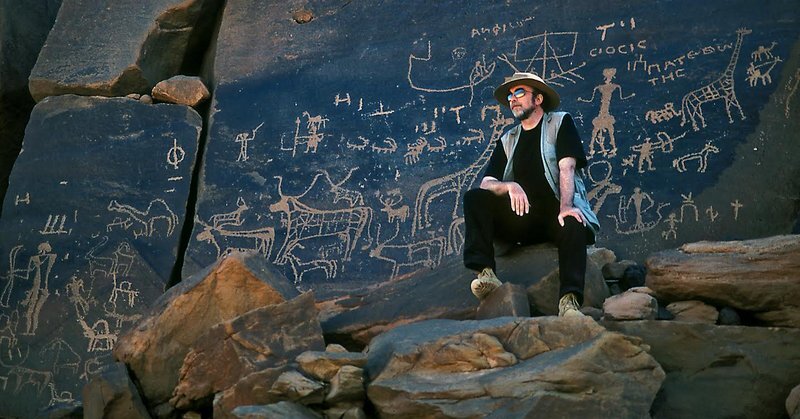 David Rohl’s life-long love affair with Egypt began in 1960 when he first travelled to the Nile valley as a nine-year-old, sailing upstream all the way from Cairo to Abu Simbel in King Farouk’s paddle steamer the ‘Khased Kheir’, following the king’s exile after the 1952 revolution.
David Rohl’s life-long love affair with Egypt began in 1960 when he first travelled to the Nile valley as a nine-year-old, sailing upstream all the way from Cairo to Abu Simbel in King Farouk’s paddle steamer the ‘Khased Kheir’, following the king’s exile after the 1952 revolution.
David was born in Manchester, England, on September 12 1950 and has spent much of his life exploring the Middle East, from the high valleys of the Zagros mountains in Azerbaijan, Kurdistan and Luristan (in search of the legendary land of Eden), to the vast expanses of the Egyptian desert (in search of the origins of pharaonic civilisation). He has been described by one UK national newspaper as ‘Britain’s highest profile Egyptologist’ and ‘the British explorer who is outdoing Hollywood’s Indiana Jones’.
David Rohl is also famous (some would say notorious) for his radical revision of the ancient Egyptian timeline. His ‘New Chronology’ proposes to remove several centuries from what he believes to be an over-extended reconstruction of history by modern scholars, to reveal a whole new set of synchronisms between Egypt and the Old Testament, as well as eliminating the Dark Ages from Greek and Anatolian histories.
______________________________________
This interview was conducted by Ryan Cochrane
______________________________________
Photo above: David Rohl in the Egyptian Eastern Desert at one of the predynastic rock art sites. Courtesy David Rohl
_____________________________________________________
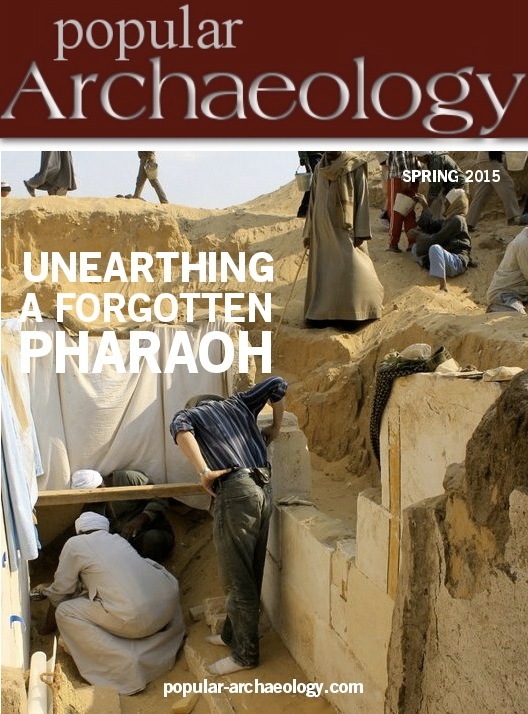 You can read our more in-depth articles about new discoveries and developments in archaeology and anthropology with a premium subscription to Popular Archaeology Magazine. Find out what Popular Archaeology Magazine is all about.
You can read our more in-depth articles about new discoveries and developments in archaeology and anthropology with a premium subscription to Popular Archaeology Magazine. Find out what Popular Archaeology Magazine is all about.
In addition, the latest Popular Archaeology ebook is now available.

